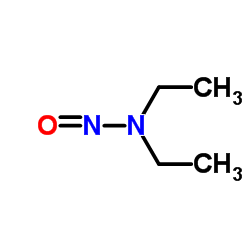N-Nitrosodiethylamine

N-Nitrosodiethylamine structure
|
Common Name | N-Nitrosodiethylamine | ||
|---|---|---|---|---|
| CAS Number | 55-18-5 | Molecular Weight | 102.135 | |
| Density | 0.9±0.1 g/cm3 | Boiling Point | 173.9±9.0 °C at 760 mmHg | |
| Molecular Formula | C4H10N2O | Melting Point | <25℃ | |
| MSDS | Chinese USA | Flash Point | 59.0±18.7 °C | |
| Symbol |


GHS06, GHS08 |
Signal Word | Danger | |
|
The Japanese toxicogenomics project: application of toxicogenomics.
Mol. Nutr. Food. Res. 54 , 218-27, (2010) Biotechnology advances have provided novel methods for the risk assessment of chemicals. The application of microarray technologies to toxicology, known as toxicogenomics, is becoming an accepted approach for identifying chemicals with potential safety proble... |
|
|
Novel study on N-nitrosamines as risk factors of cardiovascular diseases.
Biomed Res. Int. 2014 , 817019, (2014) Millions of people are exposed daily to N-nitrosamines from different environmental sources. The present study aims at investigating the role of N-nitrosamines in the alteration of homocysteine, lipid profile, oxidative stress, paraoxonase activity, antioxida... |
|
|
Genetic targeting of sprouting angiogenesis using Apln-CreER.
Nat. Commun. 6 , 6020, (2015) Under pathophysiological conditions in adults, endothelial cells (ECs) sprout from pre-existing blood vessels to form new ones by a process termed angiogenesis. During embryonic development, Apelin (APLN) is robustly expressed in vascular ECs. In adult mice, ... |
|
|
Berberine and S allyl cysteine mediated amelioration of DEN+CCl4 induced hepatocarcinoma.
Biochim. Biophys. Acta 1840(1) , 219-44, (2014) Diethylnitrosamine (DEN) and carbon tetrachloride (CCl4) have been used as initiator and promoter respectively to establish an animal model for investigating molecular events appear to be involved in development of liver cancer. Use of herbal medicine in ther... |
|
|
Epidermal growth factor receptor inhibition attenuates liver fibrosis and development of hepatocellular carcinoma.
Hepatology 59(4) , 1577-90, (2014) Hepatocellular carcinoma (HCC) is the most rapidly increasing cause of cancer-related mortality in the United States. Because of the lack of viable treatment options for HCC, prevention in high-risk patients has been proposed as an alternative strategy. The m... |
|
|
Menin promotes hepatocellular carcinogenesis and epigenetically up-regulates Yap1 transcription.
Proc. Natl. Acad. Sci. U. S. A. 110(43) , 17480-5, (2013) Menin is a scaffold protein encoded by the multiple endocrine neoplasia type 1 (MEN1) gene in humans, and it interacts with a variety of transcriptional proteins to control active or repressive cellular processes. Here, we show that heterozygous ablation of M... |
|
|
Genetic and epigenetic changes in fibrosis-associated hepatocarcinogenesis in mice.
Int. J. Cancer 134(12) , 2778-88, (2014) Hepatocellular carcinoma (HCC) is one of the most prevalent cancers and is rising in incidence worldwide. The molecular mechanisms leading to the development of HCC are complex and include both genetic and epigenetic events. To determine the relative contribu... |
|
|
PTPRO-mediated autophagy prevents hepatosteatosis and tumorigenesis.
Oncotarget 6(11) , 9420-33, (2015) Autophagy plays a critical role in the progression of nonalcoholic steatohepatitis (NASH) and hepatocellular carcinoma (HCC). Protein tyrosine phosphatase receptor type O (PTPRO) was recently identified as a tumor suppressor, but little is known about its rol... |
|
|
Cell cycle-related kinase mediates viral-host signalling to promote hepatitis B virus-associated hepatocarcinogenesis.
Gut 63(11) , 1793-804, (2014) Androgen receptor (AR) signalling contributes to male predominance in hepatocellular carcinoma (HCC), which is more pronounced in HBV-endemic areas. Cell cycle-related kinase (CCRK) is essential for AR-induced hepatocarcinogenesis but its molecular function i... |
|
|
Lycopene modulates initiation of N-nitrosodiethylamine induced hepatocarcinogenesis: studies on chromosomal abnormalities, membrane fluidity and antioxidant defense system.
Chem. Biol. Interact. 206(2) , 364-74, (2013) Oxidative damage due to free radicals generated during nitrosamine metabolism has been suggested as one of the major cause for the initiation of hepatocarcinogenesis. Lycopene, is a well known antioxidant and have promising preventive potentials, however the ... |